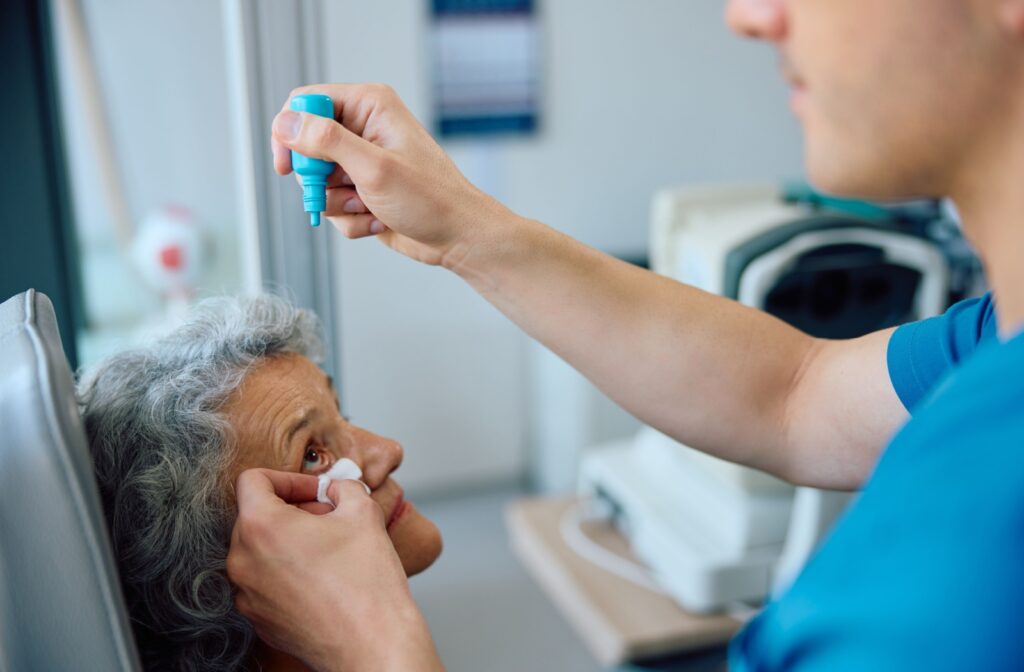Driving is a convenient and popular way to get from place to place. However, sharp vision is essential for the safety of yourself and others on the road, which is why driving after an eye exam is a common concern many adult patients have.
Whether or not it’s safe to drive after an eye exam depends on the specific tests your eye doctor performs during your exam. Most importantly, dilation plays a big role in determining your post-appointment driving comfort.
At The Eye Avenue, we typically use milder dilation drops that result in minimal disruption to your vision. That means many of our patients feel comfortable driving themselves home after an appointment. Still, if you’re not sure or if you’ve had a stronger reaction to dilation in the past, we always recommend bringing someone to drive you to and from your appointment.
If this is your first eye exam or it’s been a long time since your last visit, our compassionate team is here to guide you through it!
Why the Eye Exam You Have Matters
Not all eye exams are the same.
Some involve tests that could temporarily affect your vision, while others don’t disrupt your visual clarity at all. Recognizing this potential difference can help you plan for upcoming appointments with your eye doctor.
Most people visit their optometrist for a routine eye exam. This comprehensive visit involves basic screenings to evaluate vision, check for any refractive errors (like myopia or astigmatism), and evaluate overall eye health for potential concerns.
However, we might wish to further inspect your retinal health if you have visual concerns, general health updates, or a family history of eye diseases and other complications. These cases may require a dilated eye exam.
The Dilated Eye Exam: Defined
A dilated eye exam allows your optometrist to see deeper into the eye to examine the retina, macula, optic nerve, and blood vessels.
At The Eye Avenue, we use milder dilation drops, such as proparacaine and 0.5% or 1% tropicamide, which typically wear off after a few hours. These are different from stronger combinations used at some other clinics (like when phenylephrine is added), which can result in longer-lasting dilation.
With our approach, many patients find they can safely drive after their appointment, especially in familiar areas and normal daylight conditions.
Still, it’s important to know how dilation may temporarily affect your vision:
- Light Sensitivity: Dilated pupils allow more light to enter the eye, which can make bright environments uncomfortable.
- Blurry Vision: You might find it challenging to focus on objects, particularly things up close, like your phone or a menu.
- Depth Perception Issues: Estimating distances might be trickier during this time.
Dilation isn’t always required during a comprehensive eye exam, but it’s essential for a diabetic eye exam and sometimes emergency eye care, among other situations.

Can You Drive After a Dilation?
In most cases at our clinic, yes.
Thanks to the milder dilation drops we use, many patients are comfortable driving after their exam. That said, everyone reacts a bit differently. If you’re concerned about your ability to drive or have had a stronger reaction in the past, play it safe and bring someone with you.
Alternatives for Non-Dilated Exams
Not all exams require a dilation.
Modern imaging techniques can capture detailed photos and scans of your retina without the need for dilating eye drops. However, while these methods are convenient, they can’t always replace the effective results a dilated eye exam offers.
In some cases, a dilated eye exam is a must to help preserve your vision and maintain good eye health. We’ll discuss with you whether you benefit from having a dilated eye exam.
What About Exams Without a Dilation?
If your eye exam doesn’t include eye dilation, count yourself lucky! Driving after your eye exam shouldn’t be an issue (unless your optometrist says otherwise).
A standard eye exam focuses on assessing your visual acuity, screening refractive errors, evaluating your eye health, and updating your vision prescription if needed.
If you experience discomfort or have concerns after an eye exam, it’s always better to err on the side of caution. Please let us know if you have any issues. We’re happy to take extra measures to verify whether your vision and eye health are working as they should!
Tips to Prepare for Your Eye Exam
If you expect dilation or know you’re undergoing extensive testing, planning ahead can help make your experience smoother. Here’s how to prepare:
- Bring a Driver (Just in Case): Arrange for a trusted friend or family member to drive you home after your appointment, especially if you’ve had trouble driving after dilation in the past.
- Use UV-Protective Sunglasses: Bring a pair of dark sunglasses to shield your eyes from bright light after dilation.
- Free Your Schedule: Try to book your eye exam on a day when you don’t have pressing commitments requiring driving or heavy concentration.
- Ask About Alternatives: If you’re concerned about dilation, inquire about non-dilated imaging options ahead of time. Note, however, eye dilation might be strongly encouraged in certain cases.
Your Eye Health Is Worth the Extra Effort
Your eyes work constantly to support your daily adventures. Routine eye exams give them the care and attention they deserve.
Routine exams benefit everyone, but not all require a dilated eye exam.
At The Eye Avenue, we prioritize making every step of your appointment as comfortable as possible. If it’s been a while since your last eye exam or you’re unsure whether your exam will involve dilation, we’re happy to answer any of your questions. Connect with The Eye Avenue team to schedule your routine eye exam. Your eye health is worth the extra effort!




